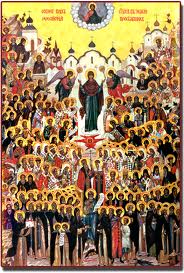On Prayer, Both Second-Hand and Spontaneous
Devra Torres | Aug 16, 2012 | 7 cmts
Whose words should we use when we pray? Someone else’s--a psalmist's, a saint's, the Liturgy's--or our own?
All of the above. But there are pitfulls, whether the prayer is the kind you memorize and recite

or the spontaneous variety.

Jen Fulwiler, a convert from atheism, was trying to get the hang of praying the Divine Office. At first, it didn’t seem to be working for her—this recitation of someone else’s words. She was reading Psalm 143:
The enemy pursues my soul;
he has crushed my life to the ground;
he has made me dwell in darkness
like the dead, long forgotten.
Therefore my spirit fails;
my heart is numb within me.
I was having a great day and feeling strong in my faith….“This is totally not speaking to me!” I thought….And then I remembered something that a commenter named Jasmine said…
“Remember that the ‘prayer of the Church’…is for the whole Church. You will not identify with every psalm at every moment, so when you pray them think of all of the people in the world praying with you who DO identify with the psalm. Pray for them and on their behalf.”
It all finally clicked….As I had yawned through the psalmist’s cry of anguish, someone out there could barely utter those same words through trembling lips and tear-stung eyes. I thought of all the people praying the Hours in that state, and for the first time was conscious of our deep connectedness as we prayed in unison as part of the mystical Body of Christ….

I thought back to my words at the beginning of the office — “But this Psalm doesn’t have anything to do with me!” — and realized that I had learned something critically important about prayer: It’s not all about me.
Still, praying with another’s words can take some getting used to. As a convert from Protestantism, I had been warned repeatedly about vain repetition, and it was hard to conceive of, say, the 53 Hail Mary’s a rosary requires as anything but vain.

But of course the repetition isn’t the problem—the vanity is. It’s all too easy to approach rote prayer like a pagan trying to flatter a god into a pliable temper,

or, worse, like a trained Human Resources MBA employing his full battery of manipulative "tools ‘n techniques" to gain an employee’s cooperation with a minimum of personal interaction.

Another pitfall can crop up with rote prayer if we feel obliged to pray words that we find off-putting—maybe they’re too flowery,

or too casual for our taste.

We might labor under the misconception that, since the Little Flower and Alphonsus Liguori were admirable saints, God must want us to ape them, style and all—instead of becoming who we are: fully ourselves.
Besides, if we reject all second-hand prayers, we’re left with just the spontaneous kind—which might seem synonymous with the genuinely personal kind.
But there are pitfalls here, too.
First of all, sometimes you’re not alone. What if you’re called upon to wax “spontaneous” in public? This is very hard. You find yourself treating others, not God, as your audience. In fact, once you’re thinking performer-audience, instead of I-Thou, you’ve already taken a wrong turn.
Second, thinking up your own words may come easy when you’re overcome with euphoria

or desperation,

but most of life plays out somewhere in between. We’re sleepy, in a bad mood, not feeling creative—but thank God, we can pray anyway, not only when we’re enjoying peak psychological condition or sunk in utter misery.
And third, sometimes actions that may well be spontaneous but aren’t prayer at all try to pass themselves off as prayer. “I thank thee, O Lord, that I am not like other men…” isn't a bad prayer: it’s not prayer at all.

Likewise, when my sister and I were little, my mother would sometimes sit us down to “pray,” only to have to listen to, “Oh, Lord, please help Abby stop making that noise,” and “Oh, Lord, please help Devra quit taking my comic books without asking.” This isn’t even inferior prayer; it’s just something else.
Really, the question isn’t so much whose words we should use, anyway. A recent article by Dan Burke quotes St. Teresa of Avila on “saying prayers”:

[S]he who does not consider with whom she speaks, and what she asks, and who she is that asks, and of whom she asks, knows little of prayer, however much her lips may move…. But whoever shall accustom himself to speak with the majesty of God, as he would talk with his slave, without considering whether he speaks properly or no, but who speaks only what comes first into his head, or what he may have learnt by heart by having repeated it at other times—this I do not consider to be prayer.
In other words, whether it’s spontaneous (“what comes first into his head”) or rote (“what he may have learnt by heart”) is not the point, but whether we’re cognizant of who is talking to whom.

Finally, prayer is not merely conversation. As one reader of Burke's articles ("Becky313") commented: like any other relationship, it includes
much non-verbal communication, a wink, a laugh, a hug, a caress, an understanding nod, thinking of the 'other' with love and devotion, being concerned and considerate of their needs and desires, planning little surprises for them, eagerly awaiting the time you have together, putting the other first, sitting quietly next to one another....head on a shoulder, simply enjoying the time spent in one another's presence.
Learning to rejoice in these kinds of dealings with the King of the Universe is not as simple as developing a knack for either memorization or spontaneous, reverent-sounding prattle. But anyone from St. Teresa to Tim Tebow will tell you: it's worth it.


Comments (7)
Katie van Schaijik
Aug 18, 2012 12:09pm
Thank you, Devra!
Two "moments" for me in learning about Catholic prayer. (I'm a cradle Catholic, but I was hugely influenced—mostly for good—by evangelicals in my teen years. I learned from them to be wary of "vain repetition", and to be ill-at-ease with Catholic prayers.)
One was in a talk by Tom Howard, explaining how he came to love praying the prayers of the Church. It was, he said, prayer that "doesn't rely on the shallow puddle of my own resources." Having often felt the shallowness of my own spiritual resources, I instantly felt the point. Now I love the whole depth and range of human experience expressed in the psalms.
Another was an almost off-hand comment by my mother, explaining why she prayed the Liturgy of the Hours. She said she loved the way it lifted her out of her own circumstances and drew her attention to the theme the Church gave the day. Today is a feast. Or today is a day of penance. It's relief from excessive subjectivism, just as Jen Fulwiler says.
Jules van Schaijik
Aug 18, 2012 8:27pm
I too love this post, Devra, especially the passages from Fulwiler. I knew, from von Hildebrand's Liturgy and Personality, the importance of being draw out of myself and my own concerns so as to participate in the objective themes and rythm of the universal Church. But I had not connected it so explicitely with concrete other persons for whom, and with whom, I could be praying. It is not just about transcending myself, but also about feeling and praying with others.
Michel Esparza
Aug 20, 2012 7:52am
There are, indeed, so many ways in communicating. One of them is repeating beautiful words -as in Hail Mary- because, after years of intimacy, the most important things have been already said...
Ann B
Aug 23, 2012 11:25am
I loved this whole post, but this has made a terrific impression on me and, I think, will change my prayer forever!
(St. Teresa of Avila:)
[S]he who does not consider with whom she speaks, and what she asks, and who she is that asks, and of whom she asks, knows little of prayer, however much her lips may move…. But whoever shall accustom himself to speak with the majesty of God, as he would talk with his slave, without considering whether he speaks properly or no, but who speaks only what comes first into his head, or what he may have learnt by heart by having repeated it at other times—this I do not consider to be prayer.
Michael Healy
Aug 24, 2012 6:38pm
I also appreciate the post, Devra.
Praying the psalms of the Divine Office not only lifts me out of myself, as others have commented, but also--now that I am over 6 decades on this earth--reminds me of when each psalm had immediate personal meaning for me. It's not just that someone in the Church is now suffering what the psalmist is describing, but that all of us at different times in our lives will go through these things, feel these responses, and have to incorporate them lovingly into our lives in Christ.
Also, as to the repetition, the 53 Hail Mary's in the Rosary, etc., how many times does a lover re-read the letter from his beloved and never fail to delight in it?
Chris Ramsey
Aug 24, 2012 7:13pm
"...trembling lips and tear-stung eyes." This short phrase has moved me to post my very first comment as a relatively new member of The Personalist Project! Having experienced moments when my lips trembled and tears spilled from my eyes as I prayed (a Psalm, a Rosary, the responses to the Liturgy of the Eucharist, a spontaneous prayer), I can only say I've been blessed with a deepening sense of "praying with the Church."
I'd like to recommend a book called "Beginning to Pray" by (then) Archbishop Anthony Bloom of the Russian Orthodox Church. He died a Metropolitan bishop in 2003. Anyway, the book was recommended to me some years ago by my parish priest and I refer back to it often. Good book! It touches on three types of prayer - spontaneous, short vocal, and ready-made. It's very short but packed with good stuff!
My prayer right this moment is that God continue to bless this wonderful project!
Devra Torres
Aug 25, 2012 9:33pm
Thank you, everyone! I've been away and offline all week and am just beginning to catch up. Chris,welcome! I've also heard very good things about Beginning to Pray.
It's like so many other areas--you start with an "either-or" alternative--either spontaneous or rote prayer, in this case--and you see that the Church takes a "both-and" approach, allowing for as much freedom and common sense as possible. And then you see that the "either-or" framework was really missing the point in the first place, because the truth is bigger than our little categories.